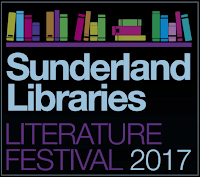Once again, several members of the School of Culture will be taking part in the Sunderland Libraries Literature Festival (download the full programme
here). These events feature our staff/students:
Colin Younger (Senior Lecturer): Expressive Writing as Therapy, City Library @ Museum & Winter Gardens, 10th October 3-4.30pm
This workshop will explore expressive writing approaches to support mental health well-being as part of Mental Health Day.
Dr Alison Younger (Senior Lecturer): Folklore and Fable in the North East, Houghton Library, 16th October 2-3pm
This session will explore the extraordinary folklore and fables of North East England.
Short Story Competition Launch, Waterstones, The Bridges, 16th October 5pm
In association with Waterstones, the University of Sunderland will launch a Short Story Competition.
Dr Geoff Nash (Senior Lecturer): The Gothic Terrorist: from Robespierre to Jihadi John City, Library @ Museum & Winter Gardens, 18th October 5-6.30pm
Gothic, terrorism, and the terrorist are rarely linked - why is this? Geoff Nash addresses the question by tracing a Gothic dimension to images of terror coming out of the political violence of the French Revolution, analysing the appearance of the anarchist terrorist in late nineteenth century fiction, and discerning in stories and journalism about contemporary terrorists and terrorist groups the hated/desired figure of the Gothic outsider.
Colin Younger (Senior Lecturer): The Hero’s Journey: How to Write a Best Seller, Washington Town Centre Library, 21st October 11-12.30pm The Hero’s Journey is a concept at the heart of many stories and by following the structure you too will be able to write your own best seller.
Dr Sarah Dobbs (Senior Lecturer): Prosegression, City Library @ Museum & Winter Gardens, 28th October 1-3pm
This session explores and pushes the boundaries of prose fiction, giving all writers new and exciting structures to work from. After the session, feel free to submit work from the workshop for consideration for a new journal in prose fiction -
Prosegression, which is coming soon. Peer reviewers include flash fiction experts David Gaffney, Tania Hersham and the world’s first professor in short fiction, Professor Ailsa Cox.
Spectral Visions Press Book Launch, Holmeside Coffee, Holmeside, 31st October 6pm
Spectral Visions Press is an innovative publishing house located at the University of Sunderland. It specialises in publishing outstanding works of creative writing, niche pieces, and writing concerned with, and inspired by, Gothic literature and Gothic studies. To include ‘Tyne And Wear’d’ and ‘A Bestiary of Monsters.’ Pay bar available.
Philippa Abbott (Doctoral student): The Struggle of the Female Victorian Underclass, City Library @ Museum & Winter Gardens, 1st November 5-6.30pm
‘The Angel in the House’ was the ideal to which many Victorian women were expected to aspire. However for those at the lowest end of the social scale, this ideal was unattainable as with no money they could not feed their family and had to go out to work. Mrs Sheppard (from William Harrison Ainsworth’s Jack Sheppard 1839) contradicts some of the assumptions made by Victorian society and highlights the struggles that women of the lower and underclasses battled with on a daily basis.
Steve Watts (Head of School of Culture): John Buchan, Richard Hannay and The 39 Steps, City Library@ Museum & Winter Gardens, 2nd November 10-11.30am
An exploration of the extraordinary life of John Buchan with an introduction to his most enduring character, the irrepressible Richard ‘Dick’ Hannay, acknowledged as the forerunner and inspiration for 007 James Bond through this classic novel.
Dr Peter Hayes (Senior Lecturer): Scott Joplin: The Triumph of the Tragedy of his Opera, City Library @ Museum & Winter Gardens, 3rd November 2-4pm
Scott Joplin is famous for his piano ragtime. However, Joplin also aspired to be an opera composer and wrote two operas, one of which,
Treemonisha, still survives.
Treemonisha folded after a single performance in New York, and its failure is said to have contributed to Joplin’s early death. A surprising connection between Sunderland and Scott Joplin will be revealed and explained in a combined lecture on Joplin’s life and performance of some of his works.
































